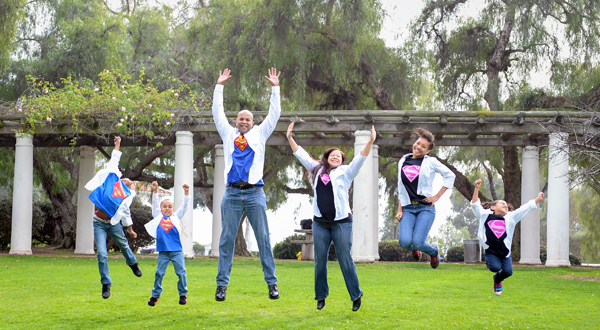Fostering love | From foster child to foster parent, a mom redeems her troubled past

Angela Posten was a minor behind bars, a foster teen who found herself in Juvenile Hall after beating up a classmate in retaliation for an earlier confrontation. While Posten admitted to authorities that she injured the girl with her fists, her victim did a little retaliation of her own, falsely accusing Posten of using a gun during the attack.
“I sat in Juvenile Hall for months and months and months while they tried to gather witnesses,” she said. “I was adamant I was not going to plead guilty to something I didn’t do.”
So the 14-year-old atrophied on a five-inch thick mattress in an isolated and chilly cinder-block cell, hoping truth would set her free. Her only respite from the closet-sized space was structured daytime activities and, once she was remanded back to her quarters for the evening, guard-escorted bathroom excursions.
“When the door slams, you hear the metal door. When they engage the locks, you hear a buzz. And that’s it,” Posten said. “If you needed anything, if you had to go to the bathroom, you would have to bang really, really loud. You could die in there and they wouldn’t know until they checked.”
Sometimes, Posten admitted, she instigated trouble with other inmates so she could get solitary confinement; those cells had their own bathrooms.
“Being locked up didn’t really bother me because I knew I was safe in there,” she said. “I didn’t have to worry about where I was going to eat, I didn’t have to worry about where I was going to sleep, I didn’t worry about someone coming in to molest me. I didn’t have to worry about someone abusing me.
“It’s sad, but other kids were praying to go home and I was praying to stay—because it was the safest place I knew.”
That’s because staying at her Dayton, Ohio home was no longer an option.
For years, Posten’s father verbally and physically abused her Vietnamese mother. Hampered by her limited English skills and with no viable resources to fight her domineering ex-husband, her mother was unable to gain custody of their only child.
Divorce failed to stop his abuse of the woman he had married.
“He continued to stalk, verbally and physically abused her, so eventually she fled town,” Posten said of her mother. “At that time there weren’t any laws to protect victims of domestic violence.
“Then his anger turned towards me. When I was in the sixth grade I confided in a teacher and, because they weren’t able to locate my mother, I was placed in foster care.”
While entering the juvenile justice system removed Posten from one threatening environment, it did little to protect her as she was trundled from one family to the next. Each time, her few belongings scooped into plastic garbage bags for the transition.
Other times she didn’t wait for her caseworkers to act, including the night she fled one foster home after the dad attempted to rape her.
“It was snowing and I was so cold that I broke into an empty house to warm up,” she said. “I remember laying there, crying and asking God what I did to deserve the life I had. Part of me wanted to die so the misery would end. The other part was begging God to protect me as I slept.”
Even as she instinctually fought for survival, Posten admits fear was her scruffy cloak.
“Being a female in foster care or homeless is really dangerous,” she said. “I was always worried about dying. But my biggest fear was that no one would even care or miss me. I think I still have the fear of dying without making a difference in someone’s life.”
Eventually, it was the very confines of Juvenile Hall where Posten first felt release from bondage.
“There were many times in my life that I questioned God for my suffering,” she said, adding that during her extended stay in Juvenile Hall she was given the option of staying in her cell or attending Sunday worship services.
“I chose the latter and that is when I was introduced to the Bible,” she said. “Psalms 25 was my go-to whenever I had problems.”
Turning it around
Nearly a year after she was incarcerated, a witness finally came forward to exonerate Posten. She was placed in a group home and got a job as a lifeguard at a local recreation center.
“No matter what I went through the night before, I looked forward to going to work and teaching kids how to swim,” she said. “The kids really looked up to me and it was the first time in my life I felt like I mattered to someone.”
The teen worked hard, stayed clean and was able to get her own apartment several months after aging out of the system—but not before living on the streets yet again when she found herself sandwiched between losing her government-funded place in the group home on her 18th birthday and her leased apartment what wasn’t ready for two more months.
“I had no furniture, other than an air mattress and milk crate that doubled as a chair and a table with a slab of wood on top,” Posten said.
It was a permanent shelter, but still wasn’t home.
“I still couldn’t help but to sleep lightly, fearful that someone would come in to get me,” she said. “It took a long time for the feelings of anxiety to go away—thinking that a social worker would come in anytime with garbage bags to move me to another home.”
Finding Mom
At 19 she managed to track down her mother and came to San Diego to be near her. As Posten worked on that relationship, she married and had a daughter of her own. As her daughter neared the teen years, Posten had an opportunity to redeem her childhood at the urging of her husband, Clark, who was moved by a TV program about a couple who adopted special needs children.
“It’s so sad there are kids out there that will feel like you did growing up,” he told his wife. “We should open our home to them.”
Fueled by the insecurity of her past, Posten said she began to seeking excuses to avoid the issue.
“I always knew I wanted to be a foster parent and give a child the home I never had, but I had doubts about what kind of parent I would be,” said Posten, who serves as a full-time case manager and client advocate at a residential housing program for senior and disabled adults.
All she knew about parenting, Posten told her husband, was what she learned from a book.
“You know what a bad parent looks like. So just do the opposite,” he said.
The Paradise Hills family decided to expand their family through Koinonia Family Services, a ministry that matches foster children with families in hopes of getting them adopted.
“Angela is amazing,” said Amy Sarmiento, a district administrator serving the region for Koinonia. “Her own journey gives her the insight and the heart to provide what these kids really need; unconditional acceptance.”
In addition to their biological daughter, the couple now has two adopted foster children and a foster son.
Clark, she said, has proved to be an integral partner in forming their new family unit.
“Together, we are a complete picture because we have been on both sides, so to speak,” she said. “He comes from a very traditional, loving, Christian family and his parents have been instrumental in all our lives.
“Some days are warm and fuzzy, like reading a bedtime story to a child for their very first time. That’s a great feeling. But, I’m also more sensitive to things that wouldn’t bother other people.”
Not a bag lady
That includes the seemingly innocuous use of plastic bags.
“Putting clothes into plastic bags—even if it’s just for wet clothes at the pool—it brings up feelings for me, so the kids’ things are always put neatly in backpacks,” the mother of five said.
Tapping into the promises of Hebrews 11:1, which offers that “Faith is the substance of things hoped for, the evidence of things not seen,” Posten said she has finally seen her journey go full circle.
“As a kid I couldn’t understand why I went through everything I did,” she said. “Now I realize those struggles made me a better parent and a better person. In the midst of a storm I can put on my lipstick, smile and say ‘OK God, let’s do it!”
God’s vision for family
By relying on God, Posten said, she’s discovered she doesn’t have to have the perfect house or perfect life to be a good mom with an open heart.
“The devil will tell you a hundred reasons why you aren’t good enough,” she said. “But there are a million ways to be a great foster parent. People are always telling us how wonderful we are for what we do. But the truth is, the kids are the true blessing. Every day they teach us about love, acceptance, forgiveness and resiliency. It breaks my heart every time we have to turn down a placement because we simply don’t have the room. Imagine the impact we could have in God’s plan if every Christian home took in one child.”
For teens still seeking a place to call home, Posten said there is hope that circumstances don’t have to define a person’s identity.
“A piece of carbon has to go through a lot of heat and pressure in order to become a diamond,” she said. “The difficult times will help you be stronger and more brilliant. The foster child label may be a legal status, but it is not who you are.”
— by Lori Arnold




